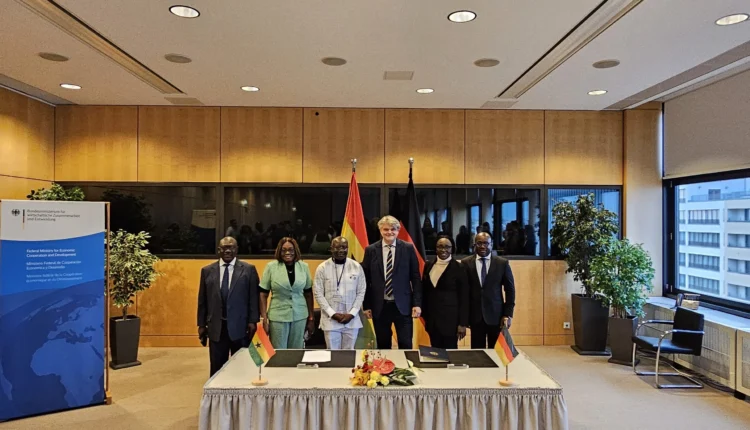In a significant stride towards fostering international cooperation and sustainable development, Ghana and Germany have concluded bilateral talks, culminating in an agreement of €145.9 million (US$158 million) in climate and energy aid, good governance, and long-term economic development.
The accord was solidified during high-level discussions at the G20 Compact with Africa summit in Berlin, where Ghanaian and German officials convened to shape the future of their partnership.
The aid package, a testament to Germany’s commitment to global sustainability, aims to bolster good governance, promote sustainable economic development, and facilitate public-private partnerships in Ghana. The agreement underscores the importance of international collaboration in addressing pressing issues such as climate change and economic development.
At the heart of the discussions was Ghana’s Finance Minister, Ken Ofori-Atta, who engaged with International Monetary Fund (IMF) Managing Director Kristalina Georgieva during the Working Lunch of Africa Finance Ministers on the margins of the G20 Compact with Africa Conference. Ofori-Atta commended the agreement, highlighting Germany’s expertise in renewable energy technologies and its potential to support Ghana’s quest to expand its renewable energy capacity.
Ghana has set ambitious targets in the renewable energy sector, with President Nana Akufo-Addo announcing plans for the development of 10,000 megawatts of renewable energy capacity through solar and wind projects. Ofori-Atta emphasized the significance of Germany’s role in assisting Ghana in achieving these goals, expressing eagerness for expanded cooperation in the renewable energy industry.
The Finance Minister stressed the shared goal of improving energy efficiency, citing Germany’s renowned engineering and innovation as crucial assets. Joint initiatives and technology transfers between the two nations could significantly reduce energy wastage and enhance the competitiveness of Ghana’s businesses.
Ofori-Atta urged German firms to explore investment prospects in key sectors such as education, technology, and manufacturing within Ghana, citing the example of German automaker Volkswagen’s new vehicle assembly plant in the country.
Economic Development
Beyond energy and economic development, the agreement also highlights the mutual commitment to addressing climate change. Ghana, vulnerable to climate-related challenges, especially extreme weather events, seeks stronger collaboration with Germany on climate-resilient projects and disaster preparedness. The Finance Minister emphasized the need for joint efforts to cut carbon emissions, safeguard natural resources, and advance green technologies.
The partnership between Ghana and Germany underscores the transformative potential of international collaboration in achieving sustainable development goals. By leveraging Germany’s expertise in renewable energy, innovation, and governance, Ghana aims to not only meet its energy needs sustainably but also boost economic growth and create employment opportunities.
The accord sets a positive precedent for future collaborations between nations committed to addressing global challenges and building a more sustainable and resilient future.
The collaborative spirit between Ghana and Germany extends beyond the realms of finance and energy, encompassing a broader vision for shared prosperity. The agreement signals a commitment to fostering innovation and job creation through public-private partnerships.
As Ghana encourages German firms to explore investment opportunities in education, technology, and manufacturing, there is a recognition of the pivotal role these partnerships can play in driving economic growth. The recent establishment of a Volkswagen assembly plant in Ghana exemplifies the tangible outcomes that arise from such collaborations, emphasizing the transformative potential of joint initiatives.
By nurturing a conducive environment for international investments and knowledge exchange, Ghana and Germany are not only building a sustainable energy future but also laying the foundation for a resilient and diversified economy that can withstand the challenges of the 21st century.


Comments are closed.